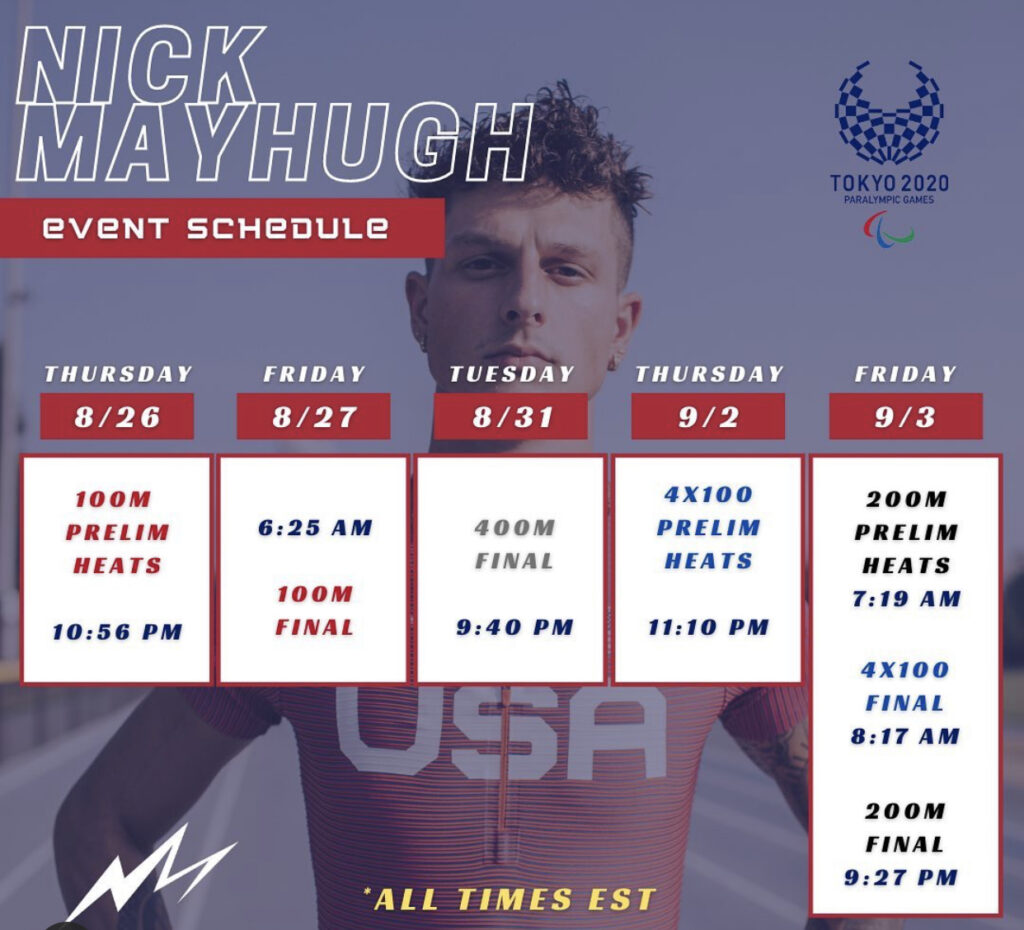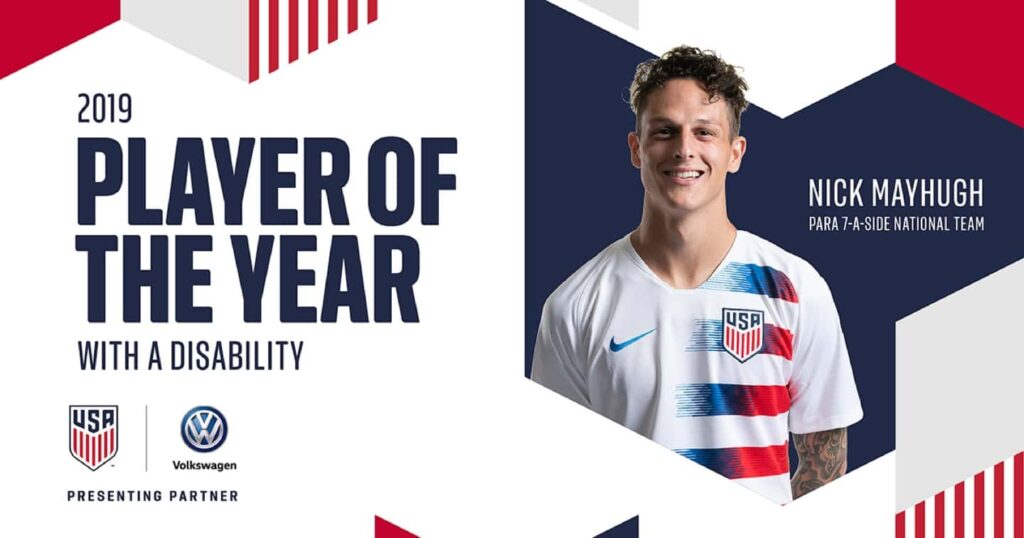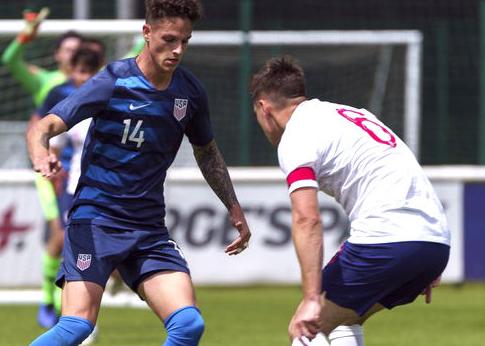
Going to go back a bit to August 2020. Justin Kavanaugh invited me down to Virginia to see what he had going on training wise and, honestly, just to get out of the house. At the time, this was the first normal day I had in a while. It was a hot, humid morning made even warmer by the heat radiating off of the turf. One of those days where you sweat without even moving.
I enjoy the summer heat, so it wasn’t much of an issue and it was just great to be in a positive atmosphere again. Behind me were some high school and college athletes training and to the left of me Kav was going over some things with three NFL hopefuls. My job was to take videos of Nick Mayhugh running his sprints and showing him the footage after each run.
This is how I do things with my athletes. I’ll take some footage and review it with them so they can see what they’re doing right and what they need to work on. Things were different this time because I just took a step back and listened to Nick break down each stride. I’d chime in if I saw something, but didn’t really have to do that more than once or twice. He was so dialed in, rewinding the video and noting any tiny change he had to make.
What’s great about going down to Virginia and working with Kav is pretty much all of his athletes are like this. They are so hyper-focused that they see things that most coaches don’t even see. This is why I always leave there rejuvenated and excited because you see what this higher level of coaching and athletics entails and makes you want to reach it.
Nick’s case is unique though. Nick was getting ready to train for the Paralympic Games in Tokyo. He will be running in the 100-meter, 200-meter, 400-meter and 4×100-meter relay. The prelim heats for the 100-meter begin on Thursday at 10:56 p.m and the events can be seen on NBC, NBCSN, Peacock TV and other supported streaming services.
What makes Nick’s situation unique is that he hasn’t always been a track athlete. You wouldn’t know it if you had watched him train for track and listened to him break down all of the tiny nuances of sprinting. He’s actually an accomplished soccer player who played four years at Radford University and was the 2019 US Soccer Player of the Year with a Disability. He scored eight goals in leading Team USA to its’ first international medal in 7-a-side in 2019.

“It’s been very hard because I had to learn all the small technical things about being a sprinter,” Mayhugh said last year. “I was used to running more of a cross-country style for 90 minutes and only having to sprint for 10-to-20 yards. In soccer, you’re not running 100 meters straight because you’re either cutting or turning.
“I train here everyday with Kav and work with a bunch of athletes who are all at a high level and see that next level of commitment and determination. It’s been a humbling experience to learn about the amount of training it takes and all the things I need to learn.”
Like most successful athletes at that level, Nick is his own hardest critic. He’s so laser-focused on all of the things he needs to improve on to get ready that it’s hard to see how far he’s come. I’ve met Nick before and watched him train a few times. Before August, I was watching him work on his block starts at the Sport and Speed Institute while Kav was also working with his NFL Combine Class.
Even after seeing him a few times, I still had no idea what his disability was. It was undetectable by watching him train. It wasn’t until I finally asked him after his session in August when I found out he was diagnosed with Cerebral Palsy when he was 14. He will have a T37 classification in the Paralympic Games.
He said ever since he could remember he always had a numb feeling on the entire left side of his body. There was a lack of coordination, motor and nerve function in his left side and he couldn’t feel his left foot contract.

“I don’t really have control of the digits in my left hand and I couldn’t really focus on cycling my legs or kicking the ball,” Mayhugh said. “Anything physically, I have a cap on my left side to a certain extent. It was really frustrating when I was younger because I was like ‘why can’t I tie my shoes like everyone else?’ or ‘why can’t I use my left leg in soccer?’ It was always my normal and I always compensated and adjusted so I could play.
“It wasn’t until I accepted and understood my disability that I took a break from putting all of that pressure on myself and doing all these extra workouts and training.”
Nick worked brutally hard to overcome his disability, even at a young age. He described a time where he’d go to practice and the coach put the team into positional drills. There was extra pressure on Nick because the coach said if he used his right foot, the team would have to run. He left every practice devastated because his team had to run because he couldn’t do certain things with his left foot.
“I trained everyday with my brother, Thomas, and he would set up all these cone drills so I could fix it,” Nick said. “I’d cry after practice and then go through all these drills with just my left foot to teach myself the muscle memory and motor function. It was a very frustrating process, but I wouldn’t be the man I am without all of that. I’ve had a chip on my shoulder my entire life.
“I had to work 100 times harder than everybody because of my disability. I didn’t fully understand it when I was younger, but I knew I’d do whatever it took to outwork every athlete I played against.”
“A lot of people and doctors that I tell and have worked with say that to the untrained medical eye you’d never be able to tell that I have a disability,” Nick said. “Up until I was 21 and joined the national team, no one knew. No one knew in college. When the story eventually came out, I was stubborn and didn’t want to talk about it, but I eventually opened up because it’s who I am. I got a lot of emails and texts afterwards from people that couldn’t believe it.”
Nick’s brother, Thomas, has been with him every step of the way. Nick started playing soccer when he was 4 years old and said he did so because he wanted to be like his brother. Thomas was there to run Nick through all of the extra drills to help make him the soccer player he’s become. Thomas, a former soccer player, owner of Mayhugh Athletic and bucket-hat aficionado, has also coached and helped prep Nick for his run in Tokyo.
“Training Nick has been a blessing to be a part of and an invaluable learning experience, thanks to Kav,” Thomas said. “Compartmentalizing being a brother and a coach is something you can’t teach and takes intentional practice. It’s something I may never truly master. But I do feel it has been what he has needed through the past year and to get to where he is. He’s coachable and he gets it and he understands and appreciates the difference between where we are on the track and in the gym versus not. That’s what’s making it work.”
Most guys grow up with the dream of playing professional sports. After everything Nick went through his entire life through college, he finally achieved his dream. Everything he worked for paid off and he had the contract in front of him. All he had to do was sign and he would be a full-time member of Team USA soccer.
But, he decided to pass it up for something he didn’t even know existed. The head director of Team USA Paralympics Track and Field actually reached out to him and said they were interested. He ran well at the time trials in 2019 and saw that this was a real possibility. This decision to put soccer on the back burner was very hard, Mayhugh said, but this opportunity was too good to pass up.
“I didn’t even know the Paralympics were a thing,” Mayhugh said. “I had no idea this world even existed. I’ve gone this far with soccer and was kind of interested in what other sports I could pursue. It was frustrating to turn down that contract because that was my dream. My window to run track is much smaller than my window to play soccer so I wanted to take advantage of that opportunity.
“I know these past three years with the national soccer team we’ve been able to do some incredible things and have unfinished business. But, hopefully I’ll be able to pick back up after Tokyo. It was a very hard, frustrating decision, but that’s what life’s about. Nothing ever comes easy.”
Just take a second to break down this decision. First, he had to put his dream of playing soccer on hold. This was something he worked excruciating hard for his entire life and went through way more obstacles than normal. Now, he had to start from scratch again and learn an entirely new sport.
Nothing has ever come easy in sport for Nick, but that seems to be the way he needs it to be. Another challenge means another opportunity, in his mind. Now, starting Thursday, he will become the first athlete selected to Team USA to complete as both a soccer and track athlete.